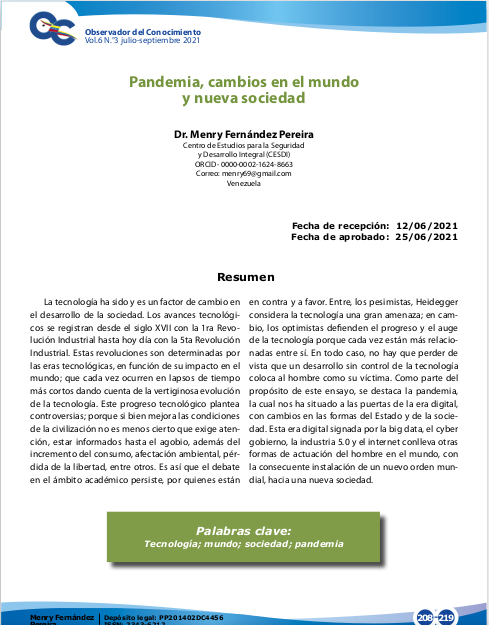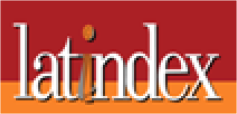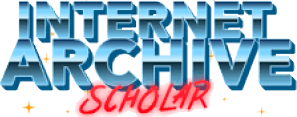Pandemic, changes in the world and new society
Keywords:
Technology, world, society, pandemicAbstract
Technology has been and is a factor of change in the development of society. Technological advances are recorded from the seventeenth century with the 1st Industrial Revolution to today with the 5th Industrial Revolution. These revolutions are determined by technological ages, based on their impact on the world; that increasingly occur in shorter periods of time giving an account of the vertiginous evolution of technology. This technological progress raises controversies; because although it improves the conditions of civilization, it is no less true that it requires attention, being informed to the point of overwhelm, in addition to the increase in consumption, environmental affectation, loss of freedom, among others. Thus, the debate in the academic field persists, by those who are against and in favor. Among the pessimists, Heidegger considers technology a major threat; instead, optimists defend the progress and rise of technology because they are increasingly related to each other. In any case, we must not lose sight of the fact that an uncontrolled development of technology places man as its victim. As part of the purpose of this essay, the pandemic is highlighted, which has placed us at the gates of the digital age, with changes in the forms of the State and society. This digital era marked by big data, cyber government, industry 5.0 and the internet entails other forms of action of man in the world, with the consequent installation of a new world order, towards a new societ.
Downloads
References
Fernández, M. (2009). Guerra sin restricciones. (Traducción, prólogo y notas), de Qiao Liang y Wang Xiangsui (1999). Unrestricted Warfare. Echo Point Books and Media. Escuela Superior de Guerra del Ejército “Libertador Simón Bolívar”, Caracas, Venezuela.
Heidegger, M. (1927). El ser y el tiempo. HarperCollins. SCM Press. State University of New York Press. New York, Estados Unidos.
Ladrière, J. (1978). El reto de la racionalidad: la ciencia y la tecnología frente a las culturas. Editores: UNESCO. Salamanca – España.
Qiao, L. y Wang X. (1999). Unrestricted Warfare. Echo Point Books and Media. Estados Unidos.
Steinbuch, K. (1970). La filosofía y la cibernética. Editorial München: Nymphenburger Verlagshandl. Alemania.
Steinbuch, K. (1989). La sociedad de información. Editorial Herford: Busse Seewald Alemania.
Spengler, O. (1967). El hombre y la técnica. Editorial Espasa Calper. Madrid, España.
Wiener, N. (1956). El uso humano de seres humanos: cibernética y sociedad. Editorial Doubleday Anchor Books. New York, Estados Unidos.
Wiener, N. (1985). Cibernética. Editorial Tusquets. Madrid-España.
Wiener, N. (1999). Dios y los Robots. Siglo XXI, Editores, S.A. Madrid-España

Downloads
Published
How to Cite
Issue
Section
License

This work is licensed under a Creative Commons Attribution-NoDerivatives 4.0 International License.







